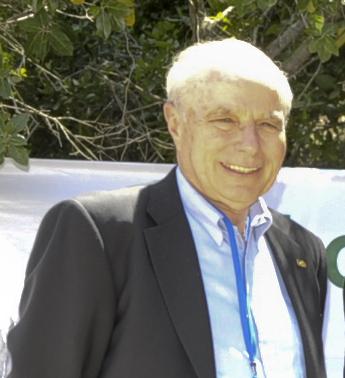Nobel laureate Professor Avraham Hershko advises young researchers not to get carried away with the flow but to go into a field where there is no competition, and for veteran researchers - not to abandon research in the field * Hershko spoke yesterday at the Nobel laureate conference at the Technion. Second article in the series

At the Nobel Prize winners' event held recently at the Technion, Professor Avraham Hershko chose to dedicate his lecture specifically to the many young researchers in the audience and outline for them the private lessons he derived from his experience in science. In the lecture he reviewed about six lessons that may help researchers.
The first lesson - good teachers above all
Professor Hershko emphasized above all the importance of the teachers that the young researcher chooses for himself. It is not possible, according to him, to do good science just by reading the scientific literature. In order to do science, one must learn how to do it from the people. Hershko spoke enthusiastically about his wonderful science teachers. The first of them was Yaakov Meiger from the Hebrew University.
” He was a walking encyclopedia in medical science. He was also an uncompromising experimenter. Each experiment had to be repeated many times to make sure it came out well. Each experiment had to be performed with the correct controls. I was very lucky to do my PhD with Meiger.”
Hershko did his post-doctorate with Gordon Tomkins, who he says was completely different from Meagher. Unlike the previous instructor, Tomkins did not worry about experiments or criticism, but demanded new ideas and imagination. Hershko says that he was lucky to be inspired by two different people, who demonstrate the contrast that always exists in science: it is very important to receive new ideas, but it is necessary to test them with uncompromising experiments.
The second lesson - don't get carried away with the current
The young researcher should find an interesting subject, but one that is not yet of interest to others. If it interests too many people, then the big laboratories will crack the issue before everyone. When Hershko arrived at Tomkins's lab, he found the lab people stuck in understanding a certain protein. The young Hershko immediately realized that the environment was too crowded, and asked for another topic, and so he came to work on the way to break down that protein. It was not a popular subject at the time, but Hershko decided it was important and continued to work on it. The lesson is not to drift with the current, but to find your own topic that you believe is important and focus on it.
The third lesson - accidental luck
The accidental diagnoses may be the most important. "Hold on to your luck!" Hershko said passionately, describing how he noticed in an experiment that the degradation of the protein he was working on required energy. The theory in those days was that the proteins break down by themselves after some time, without the involvement of intracellular processes. But if so, why do you need energy to break down a protein that should break down by itself? The additional thought put in by Hershko yielded the understanding that this is an alternative mechanism that selects certain proteins for degradation, and that the energy is found in the selective selection of the proteins. This was the basic idea for which he eventually received the Nobel Prize in 2004.
The fourth lesson - all methods are kosher
Use whatever experimental approach is necessary for your purpose, even if it is not necessarily the most fashionable (state of the art) method. There are fads in science as in anything else, and sometimes the accepted methods are appropriate, and sometimes they are not. To illustrate the point, Hershko recounted how he, Chechenover, and Ernie Ross (the third winner of the Nobel Prize for the discovery of ubiquitin) used basic and simple biochemical methods to identify a protein necessary for an energetic protein breakdown process.
The fifth lesson - the main thing is to have fun
Enjoying science is the true path to success. You cannot be successful without enjoying working in the field you choose. All researchers must do a lot of menial work, such as writing research grant applications. Despite this, he emphasized that one must not focus only on the undeclared work and make it the meaning of the study. Science loses its meaning as soon as it only serves as a tool for writing articles that will themselves be used as a basis for writing additional applications for research grants, which will enable the writing of additional studies. These are things that must be done, but they must not be made the main goal. One should enjoy the research work - and not just extract data for articles.
The sixth lesson - the morning comes, and to work
At the end of his remarks, Professor Avraham Hershko gave useful advice regarding the current laboratory work. He insisted that researchers must not neglect conducting experiments with their own hands. In every experiment where there is physical involvement, there is also mental involvement, which contributes to the joy and excitement that comes from every experiment.
Of course, in the modular laboratories that exist today, it is impossible for one researcher to conduct all the experiments by himself. Hershko acknowledged the necessity of the help of other researchers, and said that he was lucky to have their help. At the same time, he said that he himself still gets excited when he conducts experiments on himself, and when he gets unexpected results, he gets excited and enjoys it even more.
Later this week we will bring the main points of the other lectures

3 תגובות
Good things from his mouth.
Thank you very much for the article.
Interesting and waiting.
Thanks